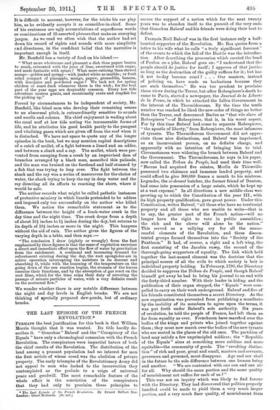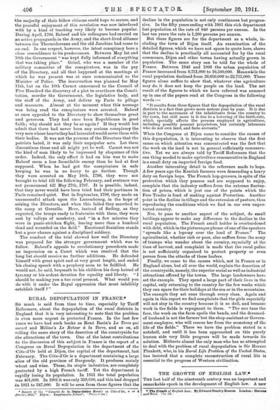TEE LAST EPISODE OF THE FRENCH REVOLUTION.*
PERHAPS the best justification for this hook is that William Morris thought that it was wanted. Its title hardly de- scribes it. " Gracchus" Babeuf and the "Conspiracy of the Equals " have only a chronological connexion with the French Revolution. The conspirators were impartial haters of both the chief results of the Revolution. The distribution of the land among a peasant population had no interest for men the first article of whose creed was the, abolition of private property. The early triumphs of the Revolutionary Army did not appeal to men who looked to the insurrection they contemplated as the prelude to a reign of universal peace and goodwill. The most remarkable feature of the whole affair is the conviction of the conspirators that they had only to proclaim these • principles to • SU It Episode of th e French Resolution. By Ernest Belfort Bar. London: Grant Richards. Les. net.]
secure the support of a nation which for the next twenty years was to abandon itself to the pursuit of the very ends. that Gracchus Babeuf and his friends were doing their best to- defeat.
Francois Noel Babeuf was in the first instance only a half- hearted supporter of the Revolution. Mr. Bar quotes from a letter to his wife what he calls "a truly significant forecast" of the events to which the fall of the Bastile was the introduc- tion. After describing the procession which carried the head of Foulon on a pike, Babeuf goes on: "I understand that the- people should do justice for itself ; I approve of that justice- so long as the destruction of the guilty suffices for it; but has. it not to-day become cruel ?. . . Our masters, instead' policing us, have made us barbarians because they are such themselves." He was too prudent to proclaim these views during the Terror, but after Robespierre's death be- came to Paris, started a newspaper, the Journal de la Liberte- de la Press°, in which he attacked the fallen Government in the interest of the Thermidoreans. By the time the tenth number was reached he liked the new order of things no better than the Terror, and denounced Barere as " that vile slave of Robespierre "—of Robespierre, that is, in his worst aspect. For by this time Babeuf had come to separate Robespierre,. " the apostle of liberty," from Robespierre, the most infamous. of tyrants. The Thermidorean Government did not appre- ciate these nice distinctions, and Babeuf was imprisoned. as an inconvenient person, on no definite charge, and apparently with no intention of bringing him to trial.. Circumstances were widening the breach between Babeuf and the Government. The Thermidoreans, he says in his paper, now called the Tribun du Peuple, had used their time well. "Barras had acquired five estates, Merlin de Thionville- possessed two chilteaux and immense landed property, and could afford to give 300,000 francs a month to his mistress.. Legendre, the ci-devant butcher, the former friend of Denton, had come into possession of a large estate, which he kept up. at a vast expense." In all directions a new middle class was. growing up to which the Constitution of the year III., with its high property qualification, gave great power. Under this; Constitution, writes Babeuf, "all those who have no territorial property and all those who are unable to write—that is. to say, the greater part of the French nation—will no- longer have the right to vote in public assemblies; the rich and the clever will alone be the nation.' This served as a rallying cry for all the unsuc- cessful elements of the Revolution, and these discon- tented groups formed themselves into the "Society of the- Pantheon." It had, of course, a right and a left wing, the- first consisting of the Jacobin rultrp, the second of the- thorough-going supporters of equality. The link which held together the last-named element was the doctrine that the- principal source of all the evils to which society is heir is. individual property holding. In February, 1796, the Directory decided to suppress the Tribun du Peuple, and though Babeuf himself got away be had to bring his journal to an end with the forty-third number. With their leader in hiding and the- publication of their organ stopped, the " Equals " were com- pelled to carry on their work underground. Babeuf and five of his friends constituted themselves a secret Directory. As the- new organization was prevented from publishing a manifesto. by the.inability of its members to agree upon the terms, it was put forth under Babeuf's sole authority. Six years. of revolution, he told the people of France, had left them as- far from equality as ever. Frenchmen have marched over the- bodies of the kings and priests who joined together against. them ; they must now march over the bodies of the new tyrants who are seated in the places of the old ones. The partition of- land may 'satisfy a few unprincipled soldiers; the " Republic- of the Equals" aims at something more sublime and more- equitable—the community of goods. The " revolting distinc tion" of rich and poor, great and small, masters and servants, governors and governed, must disappear. Age and sex shalt in the future be the sole difference between one human being- and another. " We are contented with one sun and one air- for all. Why should the same portion and the same quality of nourishment not suffice for each of us P"
This was not an inquiry which was likely to find favour with the Directory. They had discovered that polities properly handled could be made to yield them a very much larger- portion, and a very much finer quality, of nourishment than
the majority-of _their fellow citizens could hope to secure, and the peaeeful enjoyment of this revelation was now interfered with by a kind of teaching very likely to become popular. During April, 1796, Babeuf and his Colleagues had carried on an active, propaganda in the Army, and the short-lived alliance 'between the Thermidoreans and the old Jacobins had come to ME end. In one respect, however, the latest conspiracy bore a close resemblance to its predecessors. Between May 1st and 10th the Government " was kept fully informed of everything -that was taking place." Grisel, who was a member of the military committee of the conspirators, was in the pay -of the Directory, and all that happened at the meetings at
w hich he was present was at once communicated to the Minister of Police. The insurrection was planned for May 11th, but on the 10th Carnot announced to the Council of
Five Hundred the discovery of a plot to overthrow the Consti- t• ution, murder the Government, the legislative body, and the staff of the Army, and deliver up Paris to pillage and massacre. Almost at the moment when' this message was being read the conspirators were arrested. Babeuf -at once appealed to the Directory to show themselves great and generous. They bad once been Republicans in good -faith; why should not they be so again ? If they would but -admit that there had never been any serious conspiracy the very men whose hearts they bad lacerated would cover them with *their bodies. It was not the persons of the Directors that the patriots hated, it was only their unpopular acts. Let them. -discontinue these and all might yet be well. Carnot was not -the kind of man likely to be impressed by eloquence of this order. Indeed, the only effect it had on him was to make Babeuf seem a less formidable enemy than he had at first -supposed. When he had got the conspirators in -safe *keeping he was in no hurry to go further. Though they were arrested on May 10th, 1796, they were not brought to trial till the following February, and sentence was not pronounced till May 27th, 1797. It is possible, indeed, that they never wouldhave been tried had their partisans in Paris remained quiet. . But in September,.1796, they made an -unsuccessful attack upon the Luxembourg, in the hope of :seizing the 'Directors, and when this failed they marched to the camp at Grenelle. Here, instead of finding, as they expected, the troops ready to fraternize with them, they were met by volleys of musketry, and "in a few minutes they -were in panic-stricken flight, leaving more than a hundred -dead and wounded on the field." Emotional Socialism stands "but a poor chance against a disciplined soldiery.
* The conduct of the trial showed bow well the Directory was prepared for the stronger government which was to follow. Babeuf's appeals to revolutionary precedents made no impression on a Court which was resolved that the long list should receive no further additions. He defended *himself with great spirit and at very great length, and ended 'his closing speech with a prophecy soon to be fulfilled. He -would not, he said, bequeath to his children his deep hatred of tyranny or his ardent devotion for equality and liberty. "I should be making you a too cruel present. What would you -do with it under the Royal oppression that must infallibly -establish itself ? "











































 Previous page
Previous page